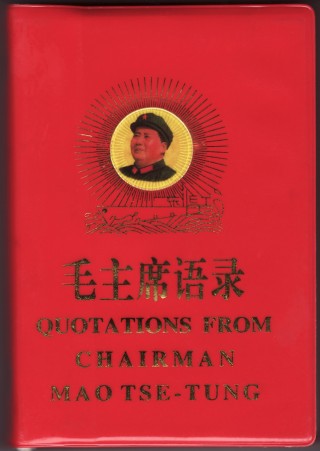October 3, 2013
The Little Red Book will be republished in China
by Dustin Kurtz

A boring book by a terrible human being.
It’s often called the second most published book in history, with only the Bible coming out ahead. Quotations from Chairman Mao is iconic, legendary, and emblematic of—indeed even responsible for—some of the worst abuses of the People’s Republic’s Cultural Revolution. Contemporary writing about the book is truly incredible. Now, for the first time in at least three decades, the book is about to be published again in a scholarly edition in mainland China.
The once-ubiquitous book is reportedly still widely available in markets across China and it’s never gone out of print in English. But in what is seen by some as a direct indication of changing party attitudes, the book is being reedited by a team at the PLA’s Academy of Military Sciences. The new edition, edited by Chen Yu, will attribute the quotations to Mao Tse Tung rather than Chairman Mao, the former seen as a more neutral option. Chen is quoted by Li Jing in the South China Morning Post as saying
Linking the publication of this book with the Cultural Revolution is totally wrong, … It is merely a publication of scientific research, not a re-publishing of the previous Quotations from Chairman Mao .
But the book is being reissued in an environment hardly imaginable ten years ago: Xi Jinping has been using Maoist jargon recently and has even, according to The Guardian, presided over a televised self-criticism session. China is not unsusceptible to a cultural nostalgia any more than Russia’s unapologetic Stalinists or the UK’s Thatcherites, so it’s no surprise that the idiom and objects of the late Maoist period might be revived, even if Mao himself is still too hot to the touch. Again, from the Guardian
Others have appropriated his heritage in unexpected ways: “There is a whole industry of Mao’s thought as managerial wisdom, much as became of Sun Tzu‘s Art of War,” said Jeremy Paltiel, a Carleton University expert on the Communist party.
What is somewhat surprising is that a press run by the PLA’s military think tank should be the one to publish the book. I have to imagine that there is some kind of market for the book beyond scholars, even if only to the young and perverse, and some callous publisher willing to make a buck off of it.
In a way it’s a shame. It’s interesting to have some books be so volatile that they are simply not made or read, and rarely sought. There’s something akin to magic in imagining a book as a taboo—the Quotations as a sort of Necronomicon. In the west, Mao has long since become, in general awareness, either an object lesson or a kitsch item. I think this new edition, whatever Xi Jianping’s motivations, is a sign that the book may have lost much of that power—a welcome change, certainly, but sorrowful, in the way that one might mourn the absence of an evil in this world.
Dustin Kurtz is the marketing manager of Melville House, and a former bookseller.